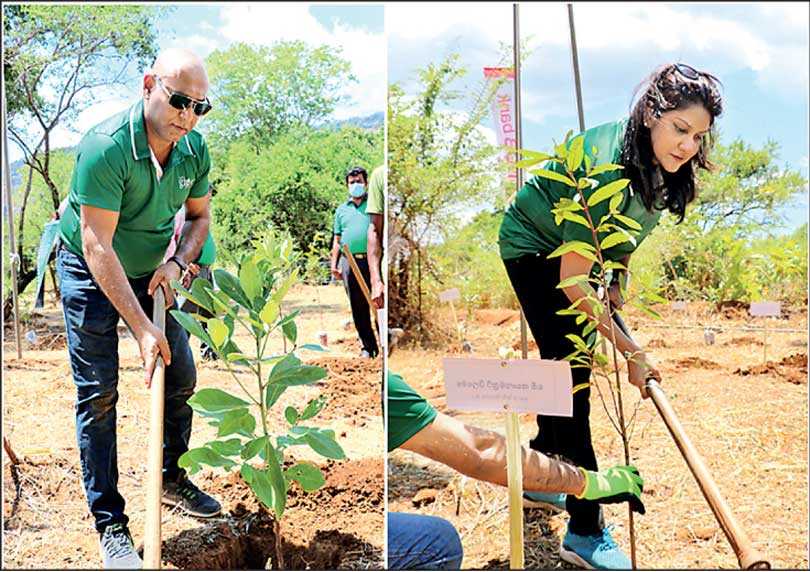Thursday Feb 19, 2026
Thursday Feb 19, 2026
Saturday, 23 January 2021 00:08 - - {{hitsCtrl.values.hits}}

NDB Director/Group CEO Dimantha Seneviratne and NDB Vice President Legal Melody Wickramanayake planting a tree
Sri Lanka has been identified as one of the biodiversity hot-spots in the Asian region, and the richest country in terms of species concentration. With a high density of species density, Sri Lanka’s natural forest resources are amongst the most floristically prosperous in Asia, providing habitants for millions of species and contributing to sustainable eco systems.
Forests are essential for our existence as they store carbon, preserve soil, and nurture a diversity of species. These non-timber benefits are known as ecosystem services.
However, at present, the threat to Sri Lanka’s unique biological diversity has increased exponentially. Forests are being destroyed on a large scale due to various reasons including encroachment due to agriculture, infrastructure development projects as well as forest fires and invasive species. The removal of forest cover destroys the habitats of flora and fauna whilst unbalancing many natural functions. This large scale removal of trees is called deforestation and has been identified as one of the most pressing environmental problems in Sri Lanka.
Deforestation aggravates climate change, causes a substantial decline in rainfall resulting in a much drier climate, causes soil erosion resulting in landslides, increases the occurrence of floods and droughts and increases the frequency of natural disasters which ultimately affects the community.
Sri Lanka’s forest cover was as high as 90% of the total land surface, about 200 years ago. This expansive forest cover has drastically diminished to 16.5% as at 2019. Between 1990 and 2000, Sri Lanka lost an average of 26,800 ha of forests per year. This amounts to an average annual deforestation rate of 1.14%. The country has now taken steps to reverse this and has embarked on an ambitious project to increase the country’s forest cover up to 40% by the year 2020. The Department of Forest Conservation is driving this project and has given the opportunity for corporate entities in Sri Lanka to partner with them in this worthy endeavour.
The simplest way to combat deforestation is by planting trees, and it is with this objective that the Bank has partnered with the Department of Forest Conservation as a new initiative to carry out a reforestation program.
The mission of the bank is to combat deforestation and protect our biodiversity which is vital for the existence of all forms of life.
The selected site for this project, the Hibiliyakada Forest is located in the Wilgamuwa Beat of the Laggala Range in Matale District, six kilometres away from Hettipola-Wasgamuwa road, in the vicinity of the Naminioya Forest and the Knuckles World Heritage Forest. The Hibiliyakada Forest is a lowland rain forest with an extent of 1,800 hectares. Around 85 hectares of the forest has degraded due to the spreading of ‘gini’ grass and forest fire. Furthermore, there is a threat of encroachment from the villagers in the vicinity, for the purpose of Chena cultivation.
The project will span a period of five years since this is the period required for the plants to grow and mature. The project was launched in 2020 under the leadership of Director/GCEO Dimantha Seneviratne, joined by members of the Leadership Team, Corporate Sustainability Committee and staff volunteers from the Head Office and the Central and North Central Regions, for the initial planting.
The planting has been completed with the assistance of the Department of Forest Conservation and 3,000 plants have been planted to date, covering a land extent of five hectares (approx. 12.5 acres). The plants include a variety of plants native to the natural eco system in the area and once grown will contribute to climate change mitigation.
The bank has also identified another issue that is degrading the plains at Pitawala Pathana, where invasive species are growing rampantly. Invasive species are detrimental to a forest and they change the character of the forest, threatening its biodiversity, overwhelming endemic species, and impacting soil quality among other concerns.
Therefore the Bank also volunteered and assisted the Department of Forest Conservation to remove the invasive plants at Pitawalapathana.
As the project progresses, the proposed plan is to expand the project to include the bordering villages where assistance would be given to uplift the villages and also to give possible assistance in protecting them from wild elephants.
The vision of the bank is that this Corporate Sustainability Project will protect the environment for the existence and sustainability of all forms of life.
NDB Bank named the ‘Bank of the Year Sri Lanka 2020’ by the Banker Magazine UK is the fourth largest listed bank in Sri Lanka and the parent company of the NDB Group.
The only financial services conglomerate in Sri Lanka, NDB Group is uniquely positioned towards assisting the growth and development of the Sri Lankan capital market to provide its customers seamless access to the product and service offerings of all its group companies.